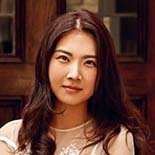 Emily Jungmin Yoon, Korean-American poet, author of A Cruelty Special to Our Species.
Emily Jungmin Yoon, Korean-American poet, author of A Cruelty Special to Our Species.
SAY GRACE
Emily Jungmin Yoon
In my country our shamans were women
and our gods multiple until white people brought
an ecstasy of rosaries and our cities today
glow with crosses like graveyards. As a child
in Sunday school I was told I’d go to hell
if I didn’t believe in God. Our teacher was a woman
whose daughters wanted to be nuns and I asked
What about babies and what about Buddha, and she said
They’re in hell too and so I memorized prayers
and recited them in front of women
I did not believe in. Deliver us from evil.
O sweet Virgin Mary, amen. O sweet. O sweet.
In this country, which calls itself Christian,
what is sweeter than hearing Have mercy
on us. From those who serve different gods. O
clement, O loving, O God, O God, amidst ruins,
amidst waters, fleeing, fleeing. Deliver us from evil.
O sweet, O sweet. In this country,
point at the moon, at the stars, point at the way the lake lies,
with a hand full of feathers,
and they will look at the feathers. And kill you for it.
If a word for religion they don’t believe in is magic
so be it, let us have magic. Let us have
our own mothers and scarves, our spirits,
our shamans and our sacred books. Let us keep
our stars to ourselves and we shall pray
to no one. Let us eat
what makes us holy.
=====
TO THE WINTER APRICOT BLOSSOM
Emily Jungmin Yoon
Did I trick you,
with the glow from my window,
the warmth of my skin?
It started with a lone flower,
ember-like in the lifting dusk,
burgeoning on the branch
nosing into my room.
At night the floret shadow dropped
onto my page, my arm, my poem.
In the snow you were heavy
with a hundred bulbs
to light the winter into spring.
A cold misty morning.
You alone illuminate the sky,
small lanterns, red, bursting lobes.
======
WHAT CARRIES US
Emily Jungmin Yoon
First, there was the horse.
Imagine creatures as majestic,
standing. All their lives they stand, withholding.
Imagine being tamed. Learning to be still,
to be speed. Imagine birds as large
as horses. We would be flying, grabbing
a majestic creature by its collar.
In cylinders of metal, we are four-legged
beast-lives of liminal spaces.
One time I was so tired of flying I wondered
if I will spend all my life packing then unpacking.
A complaint of privilege. We are such spending
creatures. And when I say we are beasts,
is that a metaphor? Metaphor, according to Papastergiadis,
is also transportation, between absence and presence,
“articulating action.” Its “very process,”
in times of extremity, is “akin to prophecy.”
I like the idea of transportation
as articulation, that the end of metaphor is a kind
of arrival, like getting off the train at an unknown stop.
So when I say we are beasts, perhaps what I mean
to do is remember that predators
have forward-facing eyes, and we do
grab others by the collar, and we do fly
in metal, in preparation for the kill.
What I want to do is slow down time.
Imagine love as a horse.
Think about us—a distance
apart only a flying thing could connect us—
standing and pacing, tamed and watching,
then finally with each other, laughing
as if to collapse, unbridled as wild horses.
In this era of brevity in this era of metal in this
era of abbreviation, yes, I’m trying to make you
think of me longer. Yes, this whole time,
the bird, the train, the whole thing
about metaphor, I said to say this,
that this is what carries us, the slow
consideration of what each other is, can be.
And first, there was the horse.